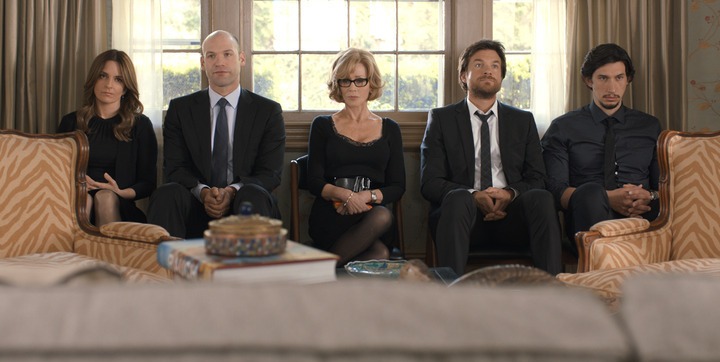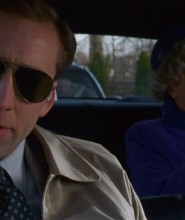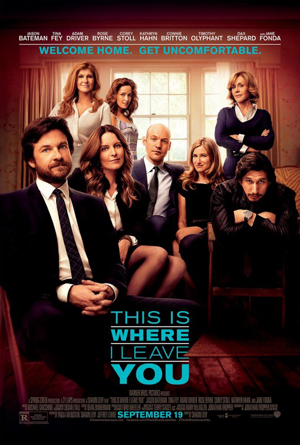
This Is Where I Leave You (2014)
by Sara Michelle Fetters - September 19th, 2014 - Movie Reviews
Talented Cast Enlivens Dramatically Muddled Where I Leave You
There’s a lot to dislike about the star-studded ensemble comedic drama This Is Where I Leave You. Adapted from his own best-selling novel, Jonathan Tropper’s screenplay is incredibly lumpy at times, filled with maudlin, treacle-laden stretches of melodrama that travel perilously close to second-rate sitcom territory. It revolves around a conceit which tends to work better in literature than it does acted out either on the stage or, in this case, the cinema screen, the fact four siblings would allow themselves to be hornswoggled into putting their lives on hold to participate in a week-long Jewish funeral ritual, when most of them aren’t even slightly religious, difficult to believe.
Yet the movie, rather nicely directed by the typically heavy-handed Shawn Levy (Night at the Museum, Real Steel), is proof that a talented cast can make the most of just about anything, the entire lot so achingly good that even the more maudlin aspects of the story feel far fresher, more alert and far more authentic than they have any right to. Each of them have signature moments which bring the film to life with authority, all having delicate, naturalistic chemistry with the other, allowing for even the most inane plot twist to sing with surprising potency. More than that, thanks to their efforts, they help Levy find the inherent truth hidden within Tropper’s narrative pretzel, bringing insight and understanding into a motion picture desperately in need of both.
Corey Stoll, Tina Fey, Jason Bateman and Adam Driver are Paul, Wendy, Judd and Philip Altman, four siblings who return to their familial home for the funeral of their loving father. Their mother Hilary (Jane Fonda), a successful author who used their respective childhoods as basis for her world-renowned book on child-rearing, tells them dad’s final wish was for the lot of them to follow Jewish custom and spend the next seven days in one another’s company. Never mind the fact he was an atheist and the rest of them are hardly religious. No. All of them, including their respective significant others (if they have them) are stuck together for the next week, all back under the same roof they grew up under once upon a time.
This is only the tip of the iceberg. Judd’s marriage is a mess thanks to the fact his wife Quinn (Abigail Spencer) is having an affair with his boss, radio shock jock Wade Beaufort (Dax Shepard). Paul’s wife Alice (Kathryn Hahn) is going insane over their inability to conceive a child. Wendy still has all sorts of feelings for her former beau Horry (Timothy Olyphant), her affection for him magnified thanks to the fact the wife and mother of two still feels guilt over a car accident both were involved in as teens leaving him slightly brain damaged as a result. As for baby brother Philip, he’s a habitual screw-up who’s trying to pull things together by romancing the older Tracy Sullivan (Connie Britton), a psychologist who got her passion for her profession in no small part thanks to Hilary’s book.
It’s a lot of stuff, and when you throw in complications regarding Judd’s pending divorce, coupled with his reconnecting with former high school friend and the town’s resident ice skating instructor, Penny Moore (Rose Byrne), as well as Hilary’s intent to maybe write a new book based on how her children respond to their father’s death, it’s all rather more than the movie’s skeletal structure can bare. Tropper’s script has trouble maintaining cohesive focus and, as such, some dramatic elements feel schmaltzier and sappily anticlimactic than they inherently should be, giving things a glossy, almost plastic-like façade that can’t help but be distancing.
Yet the actors, every single one of them, are so good, so invested in the material as well as the characters they are playing, they somehow make this supercilious pabulum not just worth stomaching, but practically worthwhile. Bateman shines, Fey has a number of notable monologues and one-liners, Stoll shows once again he’s one of the more criminally underrated character actors working today, and Driver, well gosh darn it all if Driver doesn’t just go and steal the entire film right out from underneath his moderately more famous co-stars. There is a complexity to his performance that’s surprising, and while he may not genetically look a thing like his cinematic siblings, after about two minutes I fully bought he was the family’s well-meaning, somewhat self-centered, black sheep screw-up.
But then everyone is good. Byrne, Hahn, Olyphant (a million miles away from “Justified” territory, that’s for sure), Spencer and especially Britton all get a scene or two to shine in, each of them bringing something to the table that adds to the film’s overall charm. More than that, though, Levy doesn’t push, doesn’t layer on the sap or push the melodrama into overdrive. He allows things to progress as naturalistically as they probably can, and even though some of the twists the plot has in store for the Altman clan are hardly authentic, thanks to the director’s even-keeled approach they end up feeling a lot more honest than they would have otherwise.
This Is Where I Leave You has plenty of problems. Structurally, it’s far too bloated and needlessly complicated, especially considering that the actual resolutions to the Altman family’s fractured dynamics are hardly shocking. Yet Tropper doesn’t tie everything into bright shiny bows, doesn’t give everyone the picture perfect denouement they would probably prefer. There is a melancholic grace to the last few minutes that I found touching, Levy allowing these bits to stand on their own with little unnecessary embellishment.
With the entire cast hitting on all cylinders, This Is Where I Leave You ends up being something of a minor success, and while I’m sure all involved hoped for more, considering how bad this could have been, being “pretty good” is nothing to scoff at.
Review reprinted courtesy of the SGN in Seattle
Film Rating: 2.5 out of 4








